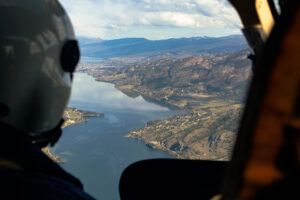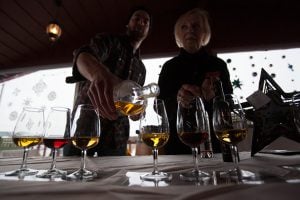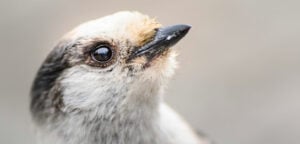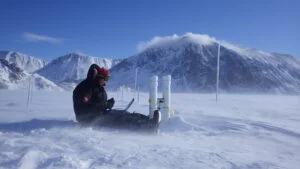
Travel
Cloud wine: heli-touring the vineyards of the South Okanagan
A couple’s guide to taking in the wine, food and unique desert scenery of Osoyoos
- 2169 words
- 9 minutes
This article is over 5 years old and may contain outdated information.
Science & Tech

Brotherhood is not always synonymous with partnership. But it is for award-winning sibling team Jules Blais and John Smol.
The half-brothers, both biology professors, recently won the Brockhouse Canada Prize for Interdisciplinary Research, along with $250,000 from the Natural Sciences and Engineering Research Council of Canada.
Though their fields of study are different, their approach is complimentary and collaborative. Smol studies aquatic ecology and paleolimnology, the study of reconstructing the history of inland waters, while Blais specializes in chemistry and ecotoxicology.
Their work, which focused on sediment cores drawn from lake bottoms, helped reveal how the earth and water are affected by pollutants over thousands of years.
“Most lakes in Canada are around 10,000 years old and we can reconstruct the past for as long as the lake has been there,” Blais says. “They’re nature’s historians.”
Smol says this long-term perspective helps reconstruct trends of how past stressors affected lake ecosystems where the data doesn’t exist.
“There’s a lack of long-term monitoring data so we have to use indirect approaches to reconstruct the past,” he says. “Like a time machine, these sediments tell a remarkable history of past ecological changes and environmental issues.”
But how accurately can their research predict when certain pollutants hit their peak?
“We saw very clearly when we started to use leaded gasoline,” Blais says. “We can see a lot of clear patterns from the time of the industrial revolution when coal combustion and gold mining caused an amalgamation process that left behind mercury deposits.”
Blais says that improved understanding of pollutant impacts has far reaching implications that will hopefully be used to inform environmental policy.
“The ultimate goal is to set regulations for industrial emissions,” he says
David Schindler, a University of Alberta ecology professor, says the work both brothers have completed over the past 15 years will be more valuable in a changing research climate. He mentions a half-year gap in research when the Experimental Lakes Area in Northern Ontario experienced a dip in funding and nearly closed in 2013.
“Given the recent cutbacks we’ve had to environmental research, the things they do will become even more important,” Schindler says. “If you don’t have long-term records, the paleo-analysis is the only way to get it.”
Are you passionate about Canadian geography?
You can support Canadian Geographic in 3 ways:

Travel
A couple’s guide to taking in the wine, food and unique desert scenery of Osoyoos

People & Culture
The world has a lot of wine. Here's part of what makes Canada's product so special

Wildlife
Canada jays thrive in the cold. The life’s work of one biologist gives us clues as to how they’ll fare in a hotter world.

Science & Tech
Celebrating Canadian Innovation Week 2023 by spotlighting the people and organizations designing a better future